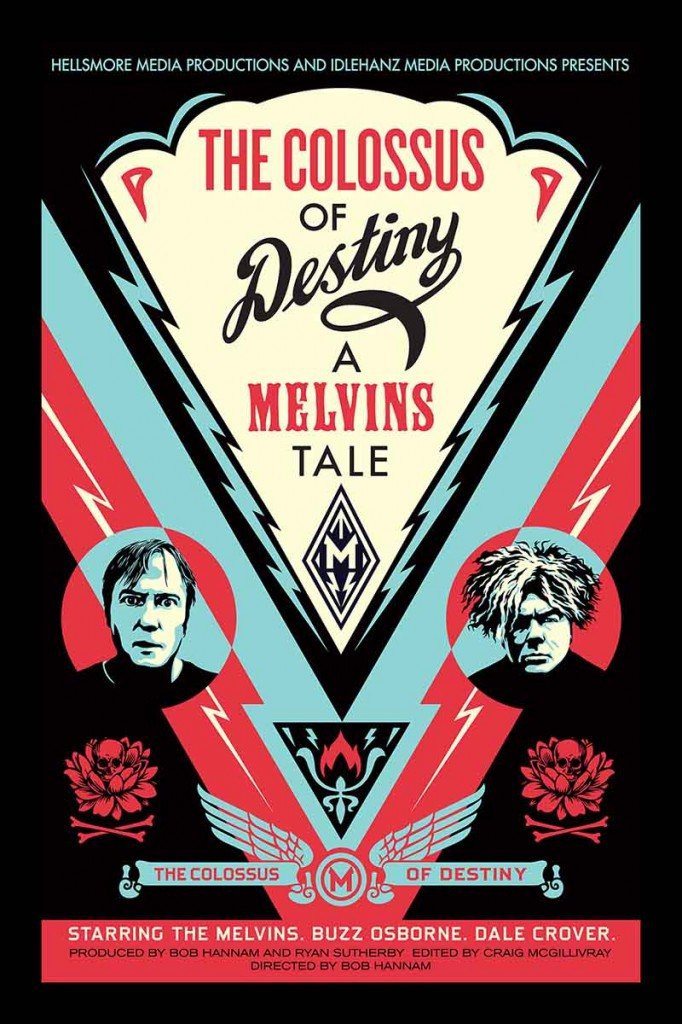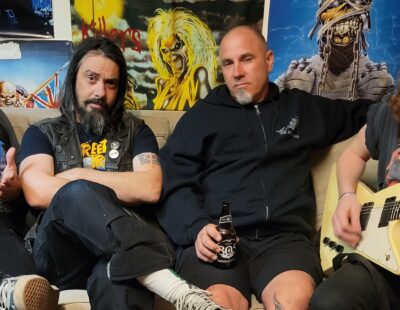
Filmmaker Bob Hannam set out to cover legendary sludge group Melvins. The end result is The Colossus of Destiny: A Melvins Tale, a lengthy, comprehensive documentary that spans the group’s three-and-a-half decade career. Decibel chatted with Hannam to get the scoop on making the movie, where you can watch it and his favorite Melvins album.
What made you want to create a documentary on Melvins?
Well, I couldn’t understand why no one had already made a film that told the story of the band. It is such a great story of a band who have been going for 34 years and are still at the top of their game, are hugely influential on so many bands and music genres as well as being sorely under-appreciated. So I felt something needed to be put out there so that more people would be educated to this. And after talking to Buzz and Dale about why this had never happened, they told me that people had threatened to make films but had never followed it up. So I said “well I’ll do it, then,” and their response was “sure, go ahead,” probably thinking I was just another person who wouldn’t follow up on my word. After a few years of filming them and still having that drive, I met Ryan Sutherby who also had the same vision and we decided to pool together and co-produce this film.
When is the documentary released? Has it previously been shown at film festivals, etc?
The film was premiered a year ago in Los Angeles and has since been shown at a whole bunch of film and music festivals and select screenings around the world. Now that has pretty much run it’s course we are getting everything ready for the online and physical release in the next few weeks. Go to www.melvinsmovie.com for all the details on how to purchase the film.
As a band with a sometimes-very weird history that spans over three decades and still going strong, how did you attempt to honestly portray Melvins?
It has to be known that there isn’t much in the way of drama and controversy in the Melvins story. They have had quite a few members come and go over the years, and the core element of Buzz and Dale are honest and open about why that happened. We reached out to everyone who had been in the band and 3 of them felt strongly enough that they did not want to be part of the film process. Even after explaining that it was not going to be a negative film, I had to respect their decisions and move on without them. Plus, after all the interviews we conducted no one really had a bad word to say about the band, so I think that made the honest portrayal very easy.
Many of the interviews in the documentary come from people outside of Melvins themselves, including Jello Biafra (Dead Kennedys), Mastodon, Neurosis, J Mascis (Dinosaur Jr.), etc. Many of these people spoke highly of Melvins and their willingness to break or bend the accepted rules of playing heavy music. Did this give you inspiration to do something different than you normally would making a movie?
As a first time filmmaker, I honestly wasn’t really sure how different the process and the final product would be from other films. But the main thing about this film that differs from most band documentaries is that there was no real fame and fortune, crash and burn, break-up periods that you usually see. You know, they start off really good, and things go great, then things go really bad, then something happens which leads to inactivity, and then they return and things are all good again with a happy ending. With this, they have just rolled along constantly producing and playing great music for such a long period of time. I cannot honestly think of another band who has done this. Even bands like The Who and The Rolling Stones have had very patchy periods in their 50 plus year careers.
And that has a lot to do with Melvins, as you say, breaking and bending the rules and just doing what they believe in. And they are still doing that to this day. Funny thing is, during the final filming, they were working on 3 future projects that we knew could not fit into the timeline of us getting the film finished and released. We had to draw a line or else it would never have got finished if we thought there might be a halt in their output. We have had to put those chapters in to the Extras footage on Disc 2.
Is there a Melvins-related memory from the process of making the movie that stands out the most to you?
I have to say that getting Gene Simmons to do an interview for the film was a huge personal high point. Being a long time early Kiss fan and knowing about the Melvins connections over the years, I knew I wanted to try and get him in there. And when I finally got word back that he was up for it, I think both Buzz and Dale were kinda surprised that I managed to pull it off. And whatever people think of Gene, good or bad, he gave us an hour of his time and delivered a truly heartfelt interview. And it was pretty damn surreal if I am totally honest with you.
There are a staggering 26 Melvins studio albums, plus a slew of live albums, demos and EPs. Do you have a favorite album or period in time throughout their career?
I wouldn’t say I have a favorite period of time in their career. The albums that I first heard in the early 90’s like Lysol, Houdini and Stoner Witch stand out just because as a music fan you tend to have a closeness to that self-discovery factor, I guess. But everything since has been great too. And as a live entity, I think they are one of the best, if not the best band performing on a stage still to this day. I just saw them play in San Francisco last week and I have to say it was one of the best shows I have seen them play in all of the 26 years I have been going to see them. How the hell does that happen?
By the time the credits roll at the end of The Colossus of Destiny, what do you hope viewers — whether they’re longtime Melvins fans or heard them for the first time when they pressed play — will take away?
The responses that have meant more to me personally have actually been from the people who have never heard, or knew little about, the band and their music. When they tell you that it was such an amazing story that they just watched and that they came away and learnt something then you have to take pride in that. They are seeing it as a story being told through film as opposed to just a music documentary, if that makes sense? And even though the hardcore fans of the band know a lot about the history and will point to things they wish were covered more in-depth they will still come away with an unknown view of how hard-working and humorous these guys really are. Myself and Ryan both agreed from the start that so long as the band and ourselves liked the film then it would all be worth it. And it certainly was.
For more info about purchasing or watching The Colossus of Destiny, head to the official website.






